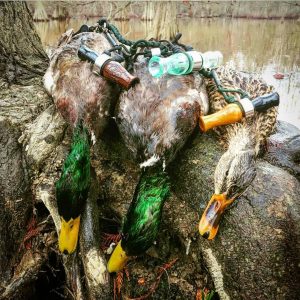Rainy Day Waterfowl – Calling with Falling Precipitation
Rain, snow, sleet, the more the better for waterfowlers. Maybe there’s something in the name “water”fowl. Ducks and geese seem to fly better when precipitation is falling, which means we love rainy day waterfowl hunting. So, since waterfowl seem to move better when precipitation is falling, how do rain, snow, and sleet affect the sound of our calls? Is all the water moving through the air affecting the sound waves from our calls?

Scientific Breakdown
The most obvious sound affect from precipitation is noise. Rain hitting leaves, sleet hitting water, and runoff dripping from trees all create background noise. This constant cacophony can drown out the quieter sounds made by waterfowl.
The other effect is more subtle. As sound waves move through the air and encounter water, they get reflected, refracted, and absorbed. All of these effects attenuate the sound wave, causing it to decrease in volume as it travels through more water drops. So, the waterfowl will hear a quieter call as compared to a day without precipitation.
Snow can have several affects on sound waves. In the air, snowflakes absorb sound waves as they move through the air. On the ground, accumulated snow can also act as a sound absorber as compared to bare ground, meaning less sound is reflected from the ground back up into the air.
If snow on the ground has crusted over, or an ice storm has covered the ground in a sheet of solid ice, then sound waves could actually be reflected more than by bare ground. The solid sheet of ice can act as an increased reflector of sound as compared to the uncovered ground, meaning your call volume will be louder. The same is true if your water hole has frozen solid, the ice will act as a sound wave reflector.
Adjusting Your Calling Style
Snow in the air combined with snow accumulation on the ground also decrease sound volume, so feel free to bump up your call volume during a snowstorm. The exception is when the ground is covered by ice or crusted snow. The hard layer can act as a sound reflector, so point your call more up in the air and blow a little easier during these conditions.
Further Reading and References
There are other weather conditions which affect sound enough to change your calling style. Check out our other articles in the series “How Weather Affects Calling”, follow us on Facebook, and subscribe to our newsletter to receive our latest articles directly in your inbox.
References
- https://en.wikibooks.org/wiki/Engineering_Acoustics/Outdoor_Sound_Propagation
- http://hyperphysics.phy-astr.gsu.edu/hbase/hframe.html
- http://www.acousticsbydesign.com/acoustics-blog/weather-affects-noise-study.htm
- https://www.quora.com/Why-do-airplanes-sound-louder-when-it-rains-or-is-cloudy
- http://wxguys.ssec.wisc.edu/2013/01/06/does-sound-travel-better-in-fog/
- http://www.sfu.ca/sonic-studio/handbook/Sound_Propagation.html


